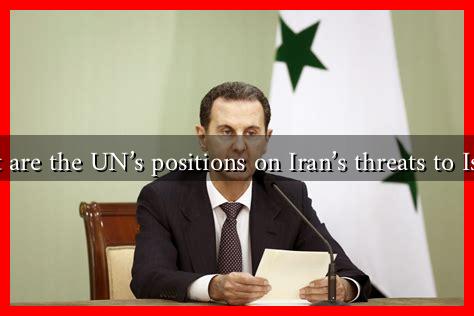-
Table of Contents
What are the UN’s Positions on Iran’s Threats to Israel?
The relationship between Iran and Israel has been fraught with tension for decades, characterized by mutual distrust and hostility. Iran’s threats towards Israel, including calls for its destruction and support for militant groups, have drawn significant attention from the international community. The United Nations (UN), as a global governing body, has taken various positions regarding these threats, aiming to promote peace and stability in the region. This article explores the UN’s stance on Iran’s threats to Israel, examining resolutions, statements, and the broader implications for international relations.
The Historical Context of Iran-Israel Relations
To understand the UN’s position, it is essential to consider the historical context of Iran-Israel relations. Following the 1979 Iranian Revolution, the new Islamic Republic of Iran adopted an anti-Israel stance, viewing the state as an illegitimate entity.
. This shift was marked by:
- The severance of diplomatic ties between Iran and Israel.
- Support for Palestinian groups, including Hamas and Hezbollah, which oppose Israel.
- Rhetoric from Iranian leaders, including former President Mahmoud Ahmadinejad, who famously called for Israel to be “wiped off the map.”
These developments have led to heightened tensions and a series of confrontations, both direct and indirect, between the two nations.
The UN’s Response to Iran’s Threats
The UN has consistently condemned acts of aggression and threats to peace, including those emanating from Iran towards Israel. Key elements of the UN’s response include:
- Security Council Resolutions: The UN Security Council has passed several resolutions addressing the broader Middle East conflict, including Resolution 2231, which endorses the Joint Comprehensive Plan of Action (JCPOA) aimed at curbing Iran’s nuclear program. The resolution emphasizes the need for Iran to refrain from activities that could escalate tensions in the region.
- Statements from the Secretary-General: The UN Secretary-General has repeatedly called for dialogue and restraint, urging Iran to cease its hostile rhetoric towards Israel. In various reports, the Secretary-General has highlighted the importance of respecting Israel’s right to exist and the need for a peaceful resolution to the Israeli-Palestinian conflict.
- Human Rights Council Resolutions: The UN Human Rights Council has addressed the human rights implications of the ongoing conflict, including the impact of Iranian support for militant groups on civilian populations in Israel and Palestine.
Case Studies and Examples
Several incidents illustrate the UN’s position on Iran’s threats to Israel:
- The 2015 Nuclear Deal: The JCPOA was a significant diplomatic effort involving multiple countries, including the US, UK, France, Russia, China, and Germany. The deal aimed to limit Iran’s nuclear capabilities in exchange for sanctions relief. The UN played a crucial role in facilitating this agreement, emphasizing the need for regional stability.
- Recent Military Escalations: In 2021, tensions escalated when Iran-backed militias launched attacks against Israeli targets. The UN condemned these actions, reiterating the need for all parties to respect international law and avoid provocations that could lead to wider conflict.
The Broader Implications for International Relations
The UN’s position on Iran’s threats to Israel has broader implications for international relations, particularly in the context of:
- Regional Stability: The UN’s efforts to mediate tensions are crucial for maintaining stability in the Middle East, a region already fraught with conflict.
- Global Security: Iran’s nuclear ambitions and its support for militant groups pose significant challenges to global security, prompting calls for a unified international response.
- Humanitarian Concerns: The ongoing conflict affects millions of civilians, necessitating a humanitarian response that the UN is often at the forefront of coordinating.
Conclusion
The UN’s positions on Iran’s threats to Israel reflect a commitment to promoting peace, security, and human rights in a volatile region. Through resolutions, statements, and diplomatic efforts, the UN seeks to mitigate tensions and foster dialogue between the two nations. As the situation continues to evolve, the international community must remain vigilant and engaged, recognizing the complexities of the Iran-Israel relationship and the broader implications for global stability.
For further reading on the UN’s role in Middle Eastern diplomacy, you can visit the United Nations Middle East section.





